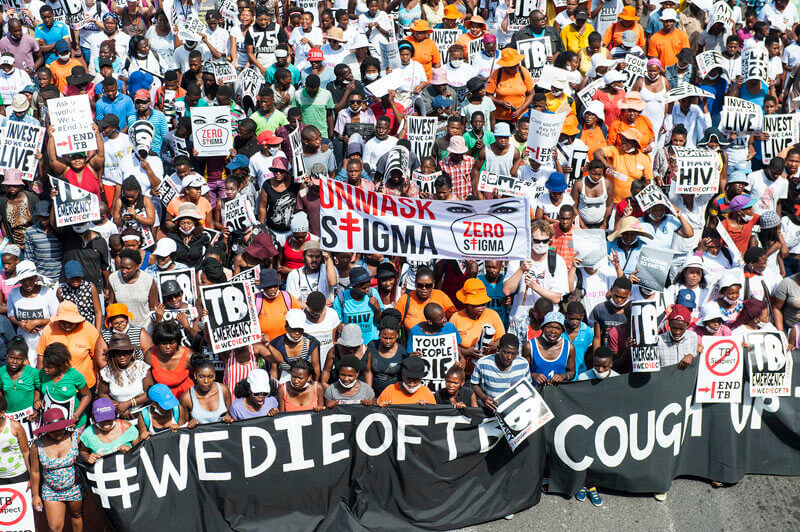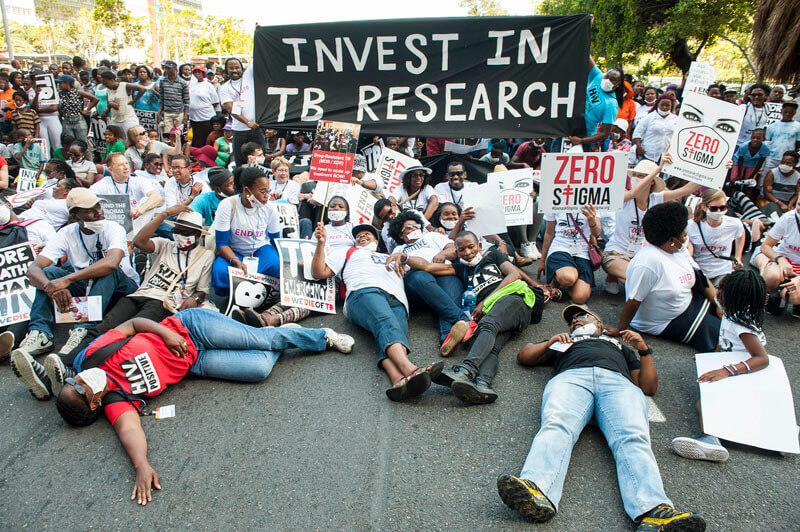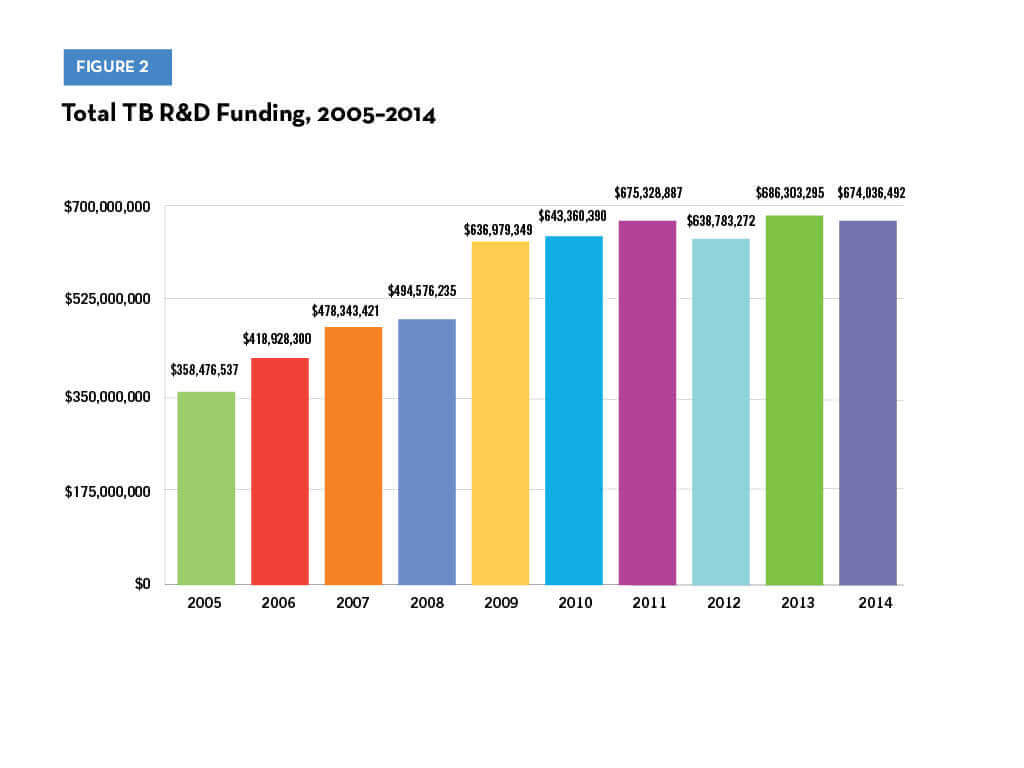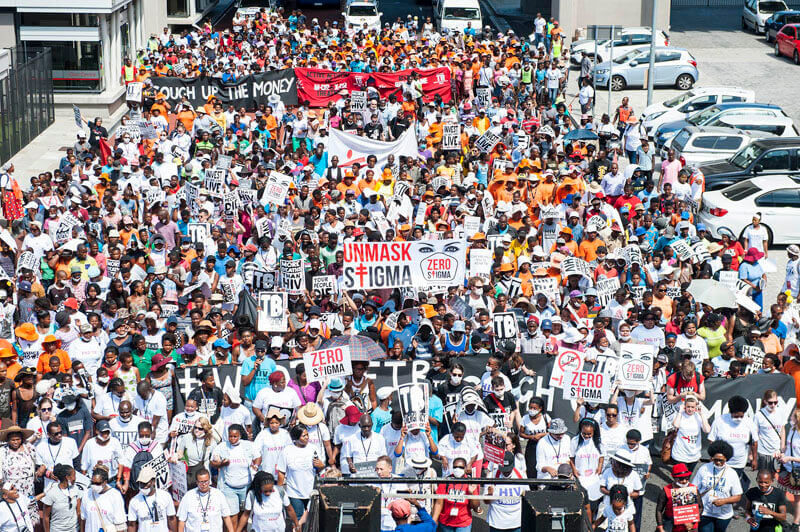In this guest post, Mike Frick, TB/HIV project officer at the Treatment Action Group (TAG), reflects on activist calls for greater investment in tuberculosis (TB) research and development (R&D) at the 46th Union World Conference on Lung Health and the stagnation of global TB R&D funding at a time of growing drug resistance.

- Activists march at the 46th Union World Conference on Lung Health in Capetown, South Africa to call for more funding for TB R&D. Photo:
David Harrison
One city, host to two TB conferences, opened by two marches, held eight years apart. In certain moments at the 46th Union World Conference
on Lung Health in Cape Town, South Africa, the present echoed the past. On Friday, December 4, 1,000 people organized by Treatment Action Campaign
(TAC) and SECTION 27 marched to the site of the conference to call on governments of the BRICS countries [Brazil, Russia, India, China, and South
Africa] plus Indonesia to triple their funding for TB R&D. The sight of so many people demonstrating in support of TB R&D called to mind
a moment at the 38th
Union World Conference in 2007 when thousands took to the streets of Cape Town demanding greater global investments in TB research and programs.

- TAC march to demand more funding for research into & the treatment of TB. Photo: David Harrison
Seasoned TB activists present at last week’s march likely experienced a feeling of déjà vu. Both marches pointed to the grave lack of investment in
TB research. And each occurred at moments their participants described as emergencies. In 2006, an outbreak of extensively drug-resistant TB in
Tugela Ferry, South Africa, captured headlines around the world and crystallized how decades of inattention had allowed TB to become more deadly.
This year, marchers carried banners reading “We die of TB,” “Invest in TB research,” and “Invest so we can live” (see photos). According to the
protest’s organizers, these messages were in response to ten years of data on global funding for TB research collected and analyzed by TAG in a
report released on November 29.
TAG’s tenth annual Report on Tuberculosis Research Funding Trends shows that after
increasing modestly from 2005–2009, funding for TB research has stagnated in the five years since. Over this ten-year period, total funding for
TB research has never exceeded more than US$700 million per year (see figure 1). In 2015, worldwide funding for TB R&D totaled $674 million,
falling $1.3 billion short of the $2 billion experts estimate the world must spend on TB research each year to eliminate TB. Funding shortfalls
have persisted in each category of research tracked by TAG—basic science, diagnostics, drugs, vaccines, and operational research—each
of the last ten years, making the last decade one of missed targets and forestalled potential.

- Credit: TAG
Members of TAC and those who marched with them understand that the pace of research to develop new drugs, diagnostics, and vaccines to fight TB is
falling behind the spread of drug-resistant TB (DR-TB). The need for better ways to prevent, diagnose, and treat TB has never been greater.
TB is now the leading cause of death from an infectious disease, responsible for more deaths each year than HIV and AIDS. In 2014, 400,000 people
newly developed DR-TB. TAG’s research suggests that filling the funding gap and accelerating TB research will depend on increasing support
from endemic country governments, which is why TAC directed the message of its march to the BRICS countries and Indonesia. Sixty-two percent
of money spent on TB research comes from public institutions, a proportion that has grown in the wake of an exodus of pharmaceutical companies
from TB research since 2012.

- Photo:David Harrison
Throughout the week, activist voices compelling greater attention to TB research reverberated throughout the conference center. Speaking at the conference’s
closing ceremony, Anele Yawa, TAC general secretary, pointed out that 40 percent of TB deaths occur in the BRICS countries, yet these nations give
only 3.6 percent of the available funding for TB research. Calling out leaders of the BRICS countries by name, Anele urged them to triple their
support for research to overcome a disease that kills so many of their people. “We can’t just tinker and settle for incremental change while our
brothers and sisters are dying,” said Anele. “We demand
a revolution in funding for TB research.”
This call appears to be gaining traction in South Africa. At the end of the march, South Africa’s Minister of Health, Aaron Motsoaledi, accepted a
memo endorsed by TAC, TAG, Médecins Sans Frontières, the Global TB Community
Advisory Board, HIV i-base, TB Proof, SECTION 27, and the People’s Health Movement. The memo called on governments to declare TB and DR-TB public
health emergencies and close the TB research funding gap. In some ways, Minister Motsoaledi’s very presence at the march was a sign of how things
have changed since the first march for TB research in Cape Town eight years ago. In 2007, no parliamentarians or ministers of health received the
protestors’ list of demands, and the stagnation of TB research funding in the years that followed suggests these earlier cries fell on deaf ears.
Political will to support TB research is also gaining traction at the global level. A week before TAG released its report on TB R&D funding, the
World Health Organization (WHO) launched the Global Action Framework for TB Research and announced the creation of a TB research focal point within the WHO’s Global TB Programme. Intensified research and innovation is the third
pillar of the WHO’s End TB strategy, which aims to eliminate TB by 2035. Through the Action Framework, the WHO aims to advance TB research by building
support for TB R&D at the country level, with a focus on low- and middle-income countries that bear the greatest burden of TB but that have
traditionally given less than 5 percent of global funding for TB R&D. As part of this initiative, the WHO will work with a group of “pathfinder”
countries to develop national strategic plans for TB research backed by concrete milestones over the next five to ten years.
It is imperative that these plans are backed by financial commitments that increase TB R&D funding above its current level. Those who marched alongside
TAC in Cape Town on December 4 took just the initial steps to build the public pressure and accountability that will be required to make the Action
Framework a success and enable the research required to end the TB epidemic—in South Africa and across the world.




